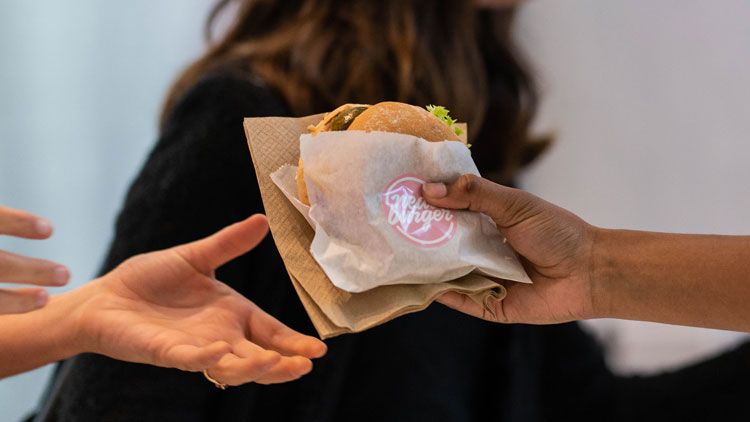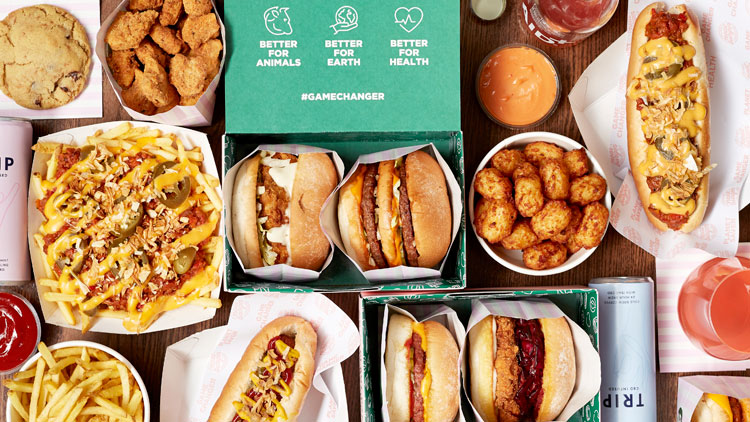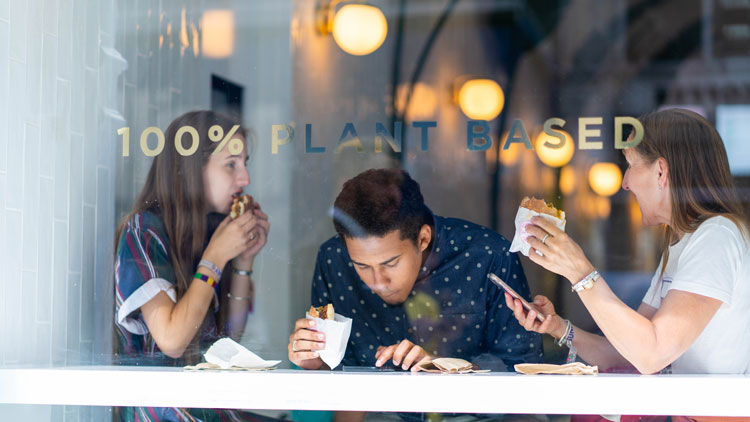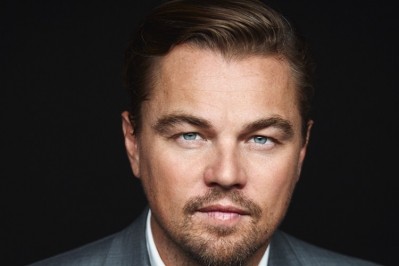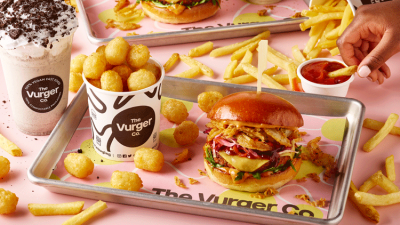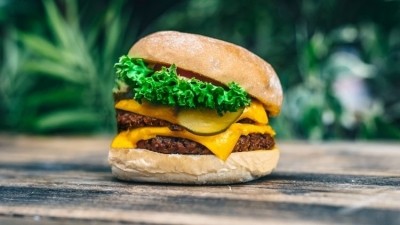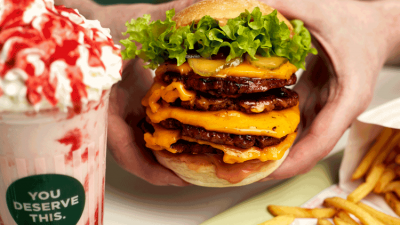Mission possible: how Neat Burger will become the biggest plant-based chain on the planet
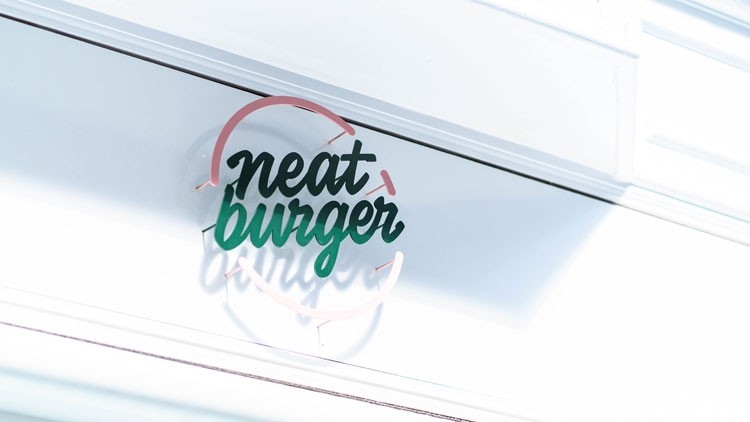
“It feels like it’s been more than a year,” says Zack Bishti, with a sigh. The co-founder and managing director of vegan fast-food chain Neat Burger is reflecting on the impact of the past 12 months. Before the pandemic hit, the group had huge plans for 2020: having successfully established its first, flagship site just off London’s Regent Street in September 2019, the eyes of Bishti and his team, which includes Formula One world champion Lewis Hamilton, were squarely on expansion.
Five new UK openings were planned before the end of the year, including a site in Westfield London. Working with Deliveroo, a delivery-only dark kitchen in Battersea was also on the slate; as was the group’s first international restaurant, in Los Angeles. But then the country, and indeed much of the world, was plunged into lockdown.
“It was a shock for everyone,” recalls Bishti. “A lot of operators, understandably, froze in that moment. Lockdown, and the reality of being mandated to close with no knowing when you would reopen, was something new and unknown; people were unsure about what to do next and how to react.”
Neat Burger’s interest in the dark kitchen space turned out to be a remarkable piece of foresight. Within five days of the first lockdown being announced, the group had opened its Battersea kitchen, and took on another four in choice areas across the capital over the next two to three months, ensuring the brand’s delivery range covered as much of the capital as possible.
“We were very savvy,” says Bishti with a nod. “As a small and nimble business, we were able to respond proactively to the situation, and immediately looked to secure as many satellite kitchens as we could manage. We had a product that translated seamlessly to delivery, and that allowed us to keep the business going.”
A change in strategy
Far from just being a quick fix to see the group through lockdown, the satellite kitchens presented Bishti with an alternative, cost-effective way of expanding Neat Burger. “Originally when we were preparing to take on the space in Battersea, I thought that the kitchens would be more ancillary to the main business,” he explains.
“What the pandemic has shown is that they are just as vital to a growing company like ours, as bricks and mortar is. As a tool for expansion, they make money and sense.”
Until now, Neat Burger has exclusively used Deliveroo Editions kitchens, but the group has just signed a partnership with dark kitchen operator Reef Technology. By this time next year, Bishti hopes that Neat Burger could have as many as 60 dark kitchen locations across the UK.
"As a tool for expansion, delivery kitchens make money and sense"
“We’ve got the ambition and hunger to take on as many as possible,” he says. “The capital requirements are lower, so you can take on locations with a much more aggressive velocity. And these platforms [we’re partnering with] have the infrastructure that will allow us to expand around the UK. For a young brand like us, it’s a great way increase our footprint and test out new areas and markets.”
Bishti is clear to point out that this doesn’t mean Neat Burger is abandoning its plans to grow its bricks and mortar presence. Indeed, despite the impact of the pandemic, the group still opened two new restaurants last year – in Camden and Soho.
A further seven launches are planned for this year, taking Neat Burger’s tally of permanent sites to 10. At least five of those will be in the in the capital, with locations in Victoria, Canary Wharf and the City all confirmed. Another is set to open within a 'major shopping centre' that's understood to be Westfield.
By the end of 2022, Bishti expects Neat Burger to have 20 restaurant sites across the UK, primarily in the capital, but with regional locations in other ‘major cities’ including, potentially, Brighton and Manchester. Looking ahead to 2023, Bishti hopes the group will have established close to 30 bricks and mortar units, in total, by the end of the third quarter.
“Bricks and mortar will always remain the heart of the Neat Burger brand,” he says. “I hate the idea that someone would only know us from delivery. We don’t want to lose sight of having those flagship, permanent restaurants in our portfolio. No matter how much of our life becomes digitised as a result of this pandemic, being able to go out to meet your friends for some food and a drink just cannot be replaced; and for us that is key.
“However, it’s also about finding that sweet spot that balances real-world presence and delivery. We don’t know what the future holds in the short or the long term. If, for whatever reason, there is another shutdown, we want to be in a position to continue trading and be able to access as broad a market as possible. And the delivery kitchens easily facilitate that.”
Keeping things tight
Crucial to the scalability of Neat Burger is its compact menu, which currently features four central burger options – the eponymous Neat Burger, the Cheese Burger, the Chick’n Burger, and the Filet-No-Fish – alongside a plant-based hotdog, and a selection of sides including sweet potato fries and tater tots.
“One of the things we found when we were researching the space is that the majority of the vegan fast-casual brands we’d looked at had big, confusing menus,” says Bishti. “They were trying to do too much to ensure their appeal was as broad as possible. We didn’t want to go down that route.
“Our aim was to create a core menu that was easy to navigate, and offer a product that was familiar in appearance, but happened to be vegan. When we were creating the burgers, a lot of time was spent thinking about the nostalgic memories of the fast food we ate when we were young and trying to replicate that.”
The spectre of Ronald McDonald looms large over Neat Burger’s menu. The Cheese and the Chick’n burgers are respective dead ringers for a McDonald’s cheeseburger and McChicken sandwich – not just in appearance, but crucially in flavour. Made using a plant-based patty created by Neat Burger’s team of chefs in collaboration with US-based food tech company Beyond Meat, and topped with a vegan cheese sauce, tomato relish and pickles, the Cheese Burger is suitably rich and tangy, if a noticeably lighter prospect than its Golden Arches equivalent.
Less comparable is the pricing. While a cheeseburger or mayo chicken will set you back only 99p at McDonald’s (a McChicken sandwich slightly more) Neat Burger is positioned in the better burger segment occupied by meat and meat-free players such as Five Guys, The Vurger Co, and GBK. A Neat Burger starts at £9.49 with cheese (£1) and spicy sauce (50p) costing extra, and its Chick’n Burger starts at £8.49.
“We’re at a place where consciousness and commerce can meet without either side giving up too much"
Bishti isn’t dismissive of the McDonald’s comparison, indeed he welcomes it and even shares similar goals in terms of market dominance. Yet he’s clear to point out what sets Neat Burger apart from the mainstream fast-food brands. “We’re at a place where consciousness and commerce can meet without either side giving up too much, and we want to be a champion for veganism and sustainability.” To that end, Neat Burger commits to planting a tree for every burger sold through donations to the Eden Reforestation Programme.
While the menu is 100% plant based, Bishti notes that Neat Burger isn’t solely targeted at vegans. “More and more people are making a conscious effort to eat less meat and adopting a flexitarian diet. Every year we see a greater number of consumers trying to phase out meat, and we want to make it as easy as possible for people to do that.”
Hamilton’s backing has been crucial to Neat Burger’s evolution. The Formula One star collaborated with hospitality organisation The Cream Group, where Bishti is creative director, to develop the brand. Other investors include UNICEF ambassador Tommaso Chiabra, who was an early backer of Beyond Meat.
“Lewis founded Neat Burger with us,” says Bishti. “He was an advocate of plant-based diets and sustainability long before we were in the space. He really engaged with the concept, and has been involved in the big brand decisions. For us, he’s a great ambassador, and has used his platform to get the brand more exposure as it’s grown.”
Standing out in a growing green category
The vegan space has expanded exponentially over the past few years, in line with the growing demands of consumers. Recent data from Deliveroo showed that orders of plant-based dishes for delivery are up 163% on the previous year. As a result, the plant-based burger market has begun to snowball – particularly in London.
Alongside Neat Burger, other notable operators looking to grow include Halo Burger, which operates sites in Brixton and Shoreditch and is currently looking to take on funding ahead of plans to franchise the brand both in the UK and internationally; and The Vurger Co, which last year secured a £1.4m investment to help expand its three-strong UK estate and develop its retail range, called Planet Organic. Meanwhile, Milan-based chain Flower Burger, which arrived in London earlier this year, has plans to open more than 40 sites in 'key UK cities' over the next 10 years.
“Before we first launched, I think I tried every plant-based burger under the sun to get an idea of what we were working against,” says Bishti, with a chuckle. “There’s a lot of vegan fast-food brands jostling for attention at the moment, but I think what sets Neat Burger apart is that we always knew how far we wanted to take the concept.
“We came out of the gate saying we wanted to be the biggest plant-based food chain in the world. Not coming from this space traditionally [The Cream Group’s portfolio is primarily comprised of nightclub brands] has allowed us to be foolhardier, more bullish and aggressive. It’s one of the reasons why we’re eager to grow fast and take on more sites than other brands might. We’ve constructed a healthy and ambitious rollout plan for the UK, and now our big focus is on how we grow the brand internationally.”
Taking on the US
Neat Burger announced plans to expand globally before it had even opened its first restaurant, saying it had 14 international franchises scheduled between 2019 and 2021. Much of that appears to have been undone by the pandemic, but the plan to take Neat Burger around the world remains a crucial goal for the business.
This expansion will happen alongside Neat Burger’s domestic growth. The chain has signed franchise agreements for Italy and the Gulf, but the main target is America.
“When we first launched in London, we received a lot of press and was subsequently inundated with offers to open up across the globe. But as we’ve grown, we’ve learnt to rein in our focus. There are plenty of countries where we think the Neat Burger concept will work, but the UK and US are our two key markets and that’s where we’re putting lots of our energy.”
As with the UK, the strategy for this expansion has changed, with the group now aiming to enter the US market using a mix of delivery kitchens and bricks and mortar sites.
“Right now, it’s about working out the best way to jump in,” adds Bishti. “We’re super excited about our international development, and we’re concentrated on trying to find the right balance that will allow us to expand across different markets simultaneously.”
